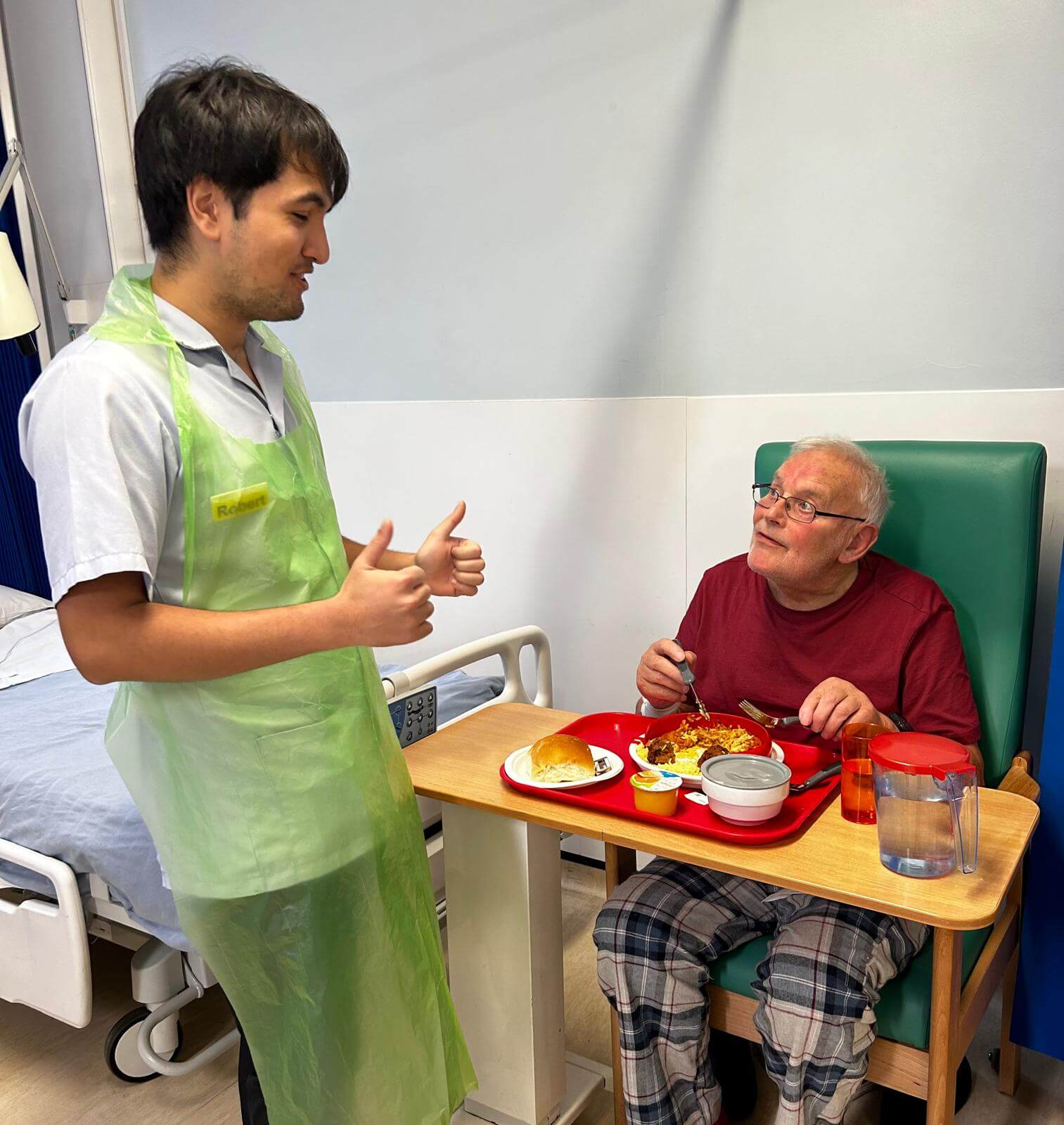Nutrition helps ensure that patients have healthy skin, better overall health, more energy and are less likely to experience falls.
With the high demand of assisted mealtimes, this creates delays and strain on the workforce. If we provide supportive mealtime equipment this will ensure our patients can feed themselves hot food without waiting to be spoon fed when they are capable, but our basic equipment is not quite right if they have arthritis in the hands or just do not have the dexterity to hold the cutlery we provide.
That is why we are raising funds for adaptive mealtime equipment, to support any adult patient who does not have the dexterity to hold the standard cutlery we issue. Plus, non-slip mats and plate guards to improve independent eating, enhancing dignity and independence for our patients.

In line with our strategic plan, we are proactively working towards creating comfortable and reassuring surroundings for our patients, staff and visitors’ wellbeing as well as providing additional technology to improve patient experience, develop and motivate staff across the Trust.
Some of our exciting plans include:
We are introducing an exciting and comprehensive Arts Programme to run across all three West Herts Hospitals. This ambitious project will require an initial budget of £100,000 for two years, including funding for a new post for an Arts and Creative Manager.
The World Health Organisation reports that Arts in Healthcare potentially impacts both mental and physical health. Incorporating arts projects into our hospital settings will enhance the overall patient experience as well as supporting staff.
Programme 1
Creative arts to include Music, Dance, Theatre, Writing, Drama and Photography designed to address Patient, Staff and Visitor needs to promote recovery and high-quality experiences. We will hold performances and run participatory activities.
Programme 2
Improve the hospital environment through exhibitions, collections and displays which will benefit staff and support the healing process for patients and visitors as well as incorporate the rich local history of art and culture.
Art can uplift and comfort patients, providing a positive and emotionally supportive environment for them.
Arts projects create opportunities for social interaction and community building among patients, families and healthcare staff.
Arts projects serve as a distraction, helping patients focus on positive and enjoyable activities and contribute to a relaxing and meditative experience, creating a sense of calm and wellbeing.
For patients facing communication barriers, such as language differences or cognitive impairments, art becomes a powerful means of self-expression.
Arts activities effectively reduce perception of pain and discomfort among patients through the immersive nature of art projects which can divert attention from physical pain, enhancing overall pain management.
Artwork displayed in hospitals contributes to a visually pleasing and aesthetically calming environment for patients and staff alike.
Arts projects reflect the cultural diversity of patients and communities, fostering inclusivity and promoting cultural understanding within healthcare settings.
Virtual reality (VR) headsets will be used to prepare young patients for MRI scans at West Herts Hospitals, offering an alternative to sedation. Two Foundation Year doctors at West Herts Hospitals, Andrew Zhou and Rohan Misra, have developed a VR game to alleviate the stress and anxiety associated with MRI scans for children.
MRI scans are crucial for displaying internal body structures and detecting various medical conditions. However, for children undergoing an MRI scan, the experience can be challenging.

The primary difficulty lies in the necessity for a child to remain completely still for an extended period. Issues that can arise if this isn’t possible include:
Addressing this problem required an innovative and child-friendly solution to help children feel more comfortable and cooperative during MRI scans. The need is to significantly reduce the need for sedation and for re-scans.
Foundation Year 2 doctors, Andrew Zhou and Rohan Misra have worked with VR developer Neeti Kumar to create a virtual reality game to educate and prepare children for their MRI scan at Watford General in a fun and innovative way. The game includes customisable characters and challenges suitable for children of different ages and learning abilities. The aim is that the game will help reduce anxiety and help to prepare young patients for their scan. The VR game is expected to accelerate the preparation process, which will save time, costs, and improve the patient experience. For the play specialist who helps to prepare a young patient for their scan, this offers an additional tool that is child-friendly and will appeal to young patients of all ages.
During the play specialist assessment, a young patient will initially be given the chance to experience the VR game. At this stage, play specialists would usually use more time-consuming methods to help prepare a child for an MRI scan, but the use of VR will accelerate the process and help prepare a young patient more efficiently and in a fun and innovative way. This will then prevent the need to sedate the child to have a scan completed, saving time, costs and improving patient experience.
West Herts Hospitals Charity CEO, Alison Rosen, said: “We’re delighted to fund this technology which aims to reduce the need for sedation in young patients. The team here were very impressed by Rohan and Andrew’s idea. Huge thanks to All Aboard Charity Shops whose grant will enable the clinicians to purchase the headsets, develop the game and run trials.”
By giving us your email address, you’re giving us permission to email you about our news, events and fundraising. For further details in relation to how we handle the personal information you provide to us, please see our privacy notice.